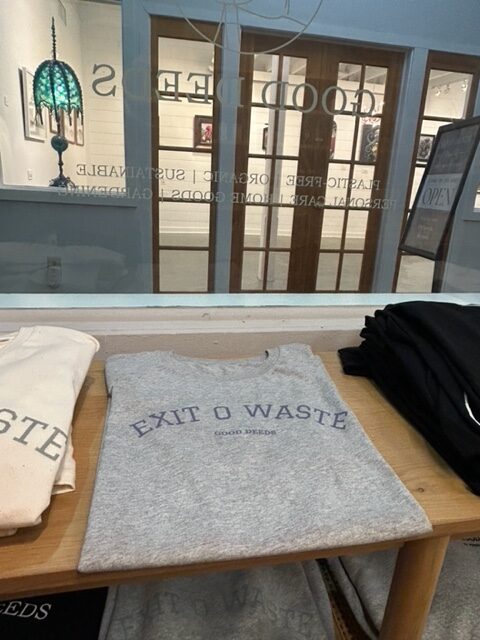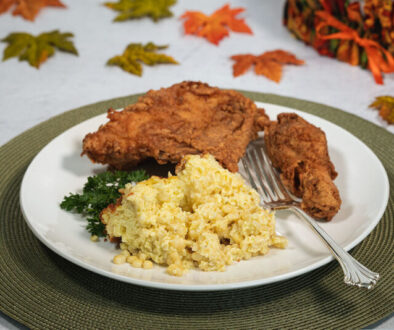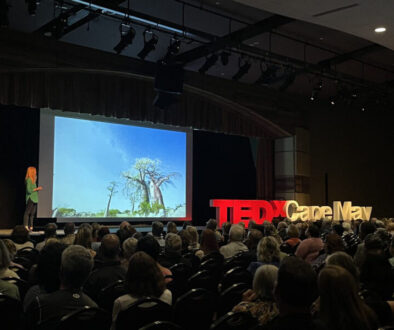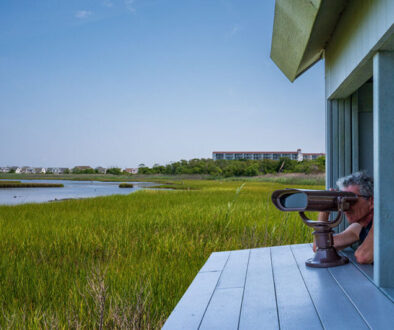Buying Local, Supporting Sustainability
Supporting local businesses is a key to sustainable living. In Cape May, it’s easy to do. A short drive to a local store is better for our planet by reducing carbon emissions, and less plastic is used to ship packaged goods. Buying a beverage from a local coffee shop typically means you’re enjoying locally roasted beans and a unique vibe not found at chain shops. And if you’re picking up a meal or a gift from a Cape May business owner, you’ll likely be able to talk with that owner, who’s usually happy to explain where that purchase was sourced.
Several small businesses are founded on an ethos of sustainability in our community. For Jacki D’Amato, owner of Good Deeds Market in the Carpenter’s Square Mall, “Our mission is offering products that support both people and the planet.” Anyone looking to purchase sustainably sourced products should check out this store. In fact, in December 2024, the sustainable living content hub Green Matters ranked Good Deeds Market third among all zero-waste shops in the country.
A visit to their store or website reveals an impressive range of zero-waste personal care products from makeup, shampoos, organic and biodegradable home cleaning supplies, to eco-friendly pet supplies. I dabble in painting birds, and didn’t know a make-it-yourself oil paint base existed until I found it at Good Deeds Market.
After learning from their website that the main ingredient in nearly all lip balms is petroleum—a byproduct from oil and gas production, I also plan to try the vegan zero-waste peppermint lip balm by supplier Simple Alchemy Co. It is currently sold out, but I’ll await a restock.

D’Amato’s commitment is the essence of the brand. “Being deeply rooted in sustainability, we make every effort to source and manufacture products as close to home as possible.” Her commitment to prioritizing and expanding in-house manufacturing has helped Good Deeds Market “cushion the effects of recent supply chain disruptions.”
As tariff increases become a reality in today’s economy, the effects are felt across all sectors. Supply chain complexities can be especially complicated for small businesses. With some of Good Deed’s product lines, a significant number of the highest-quality sustainable products are imported from France, Italy, and Canada. “Even when sourcing from U.S. companies,” she explains, “it’s common for ingredients or components to be imported.”
That means, even for in-house production, tariff-related changes could disrupt the supply chain. She notes several unexpected challenges for both her and her customers. A rise in overall costs has caused reversals from compostable packaging to conventional versions. As some companies reformulate products, if they no longer align with Good Deed Market’s quality standards, they’re no longer offered. Some companies that previously sold wholesale have shifted to direct-to-consumer models, leaving retailers like D’Amato without popular products in stock.
While these and other challenges have presented unexpected hurdles, Good Deeds Market remains committed to its core principles. “Tariffs have introduced new complexities into how we operate and source products, but we’re navigating these changes with our values intact,” she said. “We’re grateful for our customers’ continued support and patience, and remain committed to fair pricing. As our costs have increased, some prices reflect those changes; however, every decision is made thoughtfully.”
Not far from Good Deeds, at Decatur Street and Carpenters Lane, is boutique clothing store Willow & Stone. Founder Cindy Huf also owns and operates Washington Mall staples Good Scents and Red Oak Trading and launched Willow & Stone in 2020 with an eye toward eco-friendly, ethically produced merchandise for men and women. Emphasizing quality, sustainable products for Willow & Stone was Huf’s response to fast fashion.
For me, combine accessorizing with sustainability and I’m sold. Cue Willow & Stone’s Matt & Nat brand of vegan leather bags. These whimsically colored totes are cruelty-free and crafted from recycled PVB material. If you’re wondering, like me, ‘what is PVB?’: polyvinyl butyral is the resin used in laminated windshield safety glass. I’ll never look at my vegan purses in the same way! Another Willow & Stone supplier, Sling & Stone, offers men’s shower and shave needs. Their handcrafted cruelty-free products contain essential oil blends and no parabens.
Like D’Amato, Daniel Hyland, Willow & Stone’s manager, cited concerns with tariff increase effects. “Much of our spring and summer inventory was unaffected by them because we received it in February. Now that we’re ordering for fall, we’re really starting to see the impact of the low inventory and increased prices. In fact, one of our companies will not be included in our fall merchandise because they can’t get their product into the U.S.”
Although Willow & Stone remains committed to fair pricing by absorbing some of the supplier costs, some changes will become necessary. “Some companies have started tacking on a 10% surcharge without notice, or increased shipping costs to cover their expenses. We try to absorb some of this, but at the end of the day we have to increase the price of some products.”
The next time you’re weighing where to shop or eat, support locally owned stores and restaurants. Keeping them busy is good for the owners, and they’re essential to keeping our Cape May community special.



